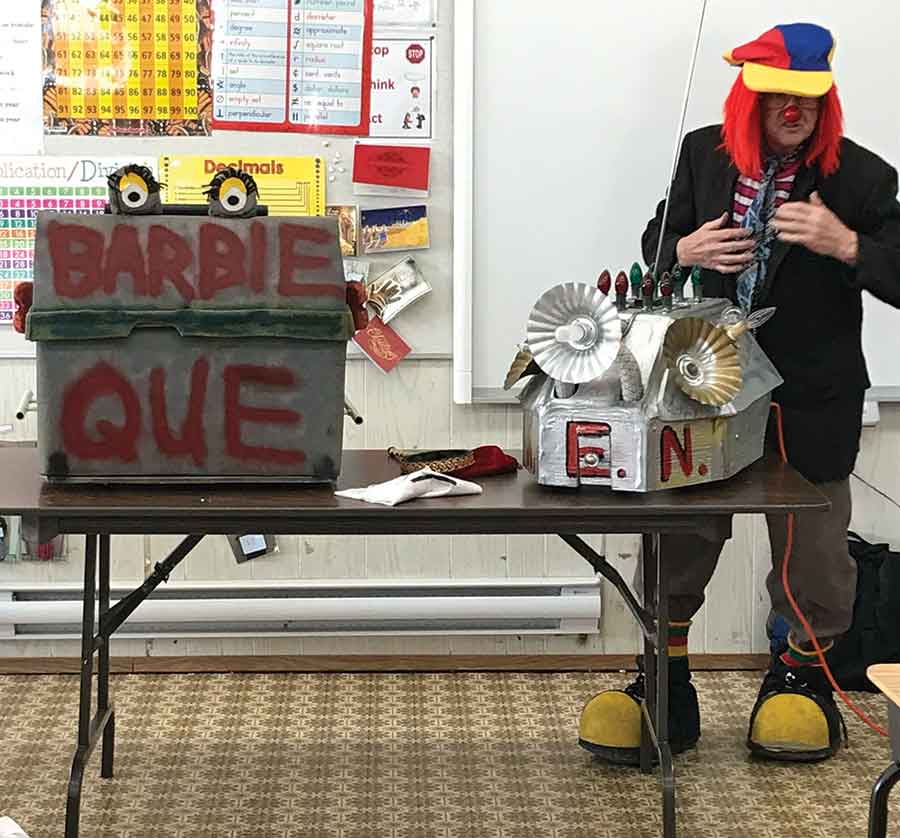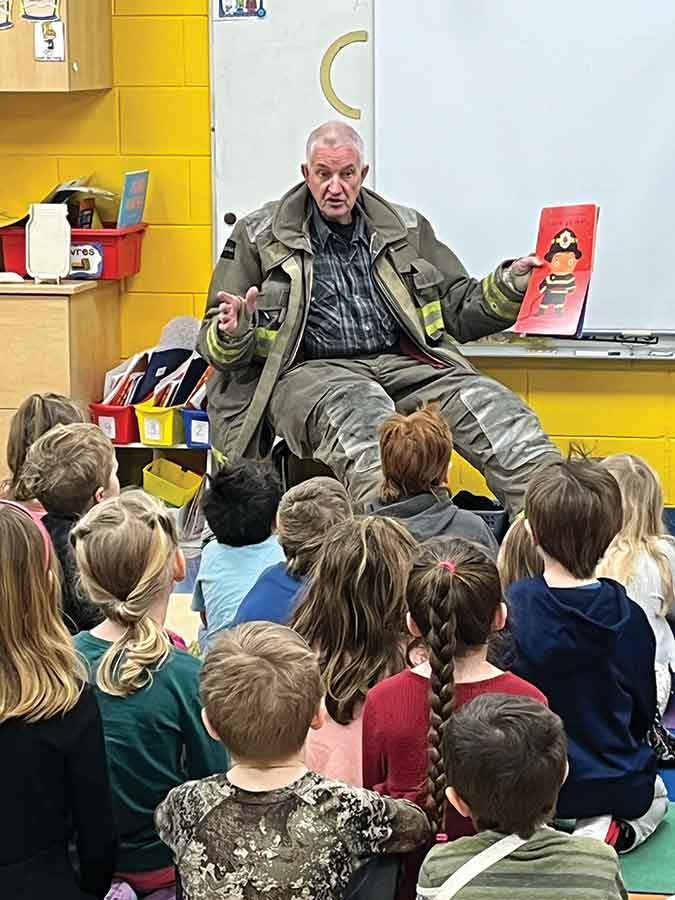After 35 years of serving as the Carman Dufferin Fire Department’s (CDFD) public education officer, Martin Dewit is ready to hang up his jacket and helmet as he steps into retirement.
Dewit joined the department in 1990 as a volunteer firefighter but quickly discovered a passion for teaching children about fire safety.

“I have always gotten a kick out of kids, and when they came around it would only take a small part out of my day to do it,” he said. “So eventually, I guess I just came to be the guy who did it.”
School visits soon became one of the most meaningful aspects of his role. While he’s lost count of the number of presentations he’s given, Dewit says his goal was always the same — to make fire safety memorable and fun for everyone, including Barbie Que.
Barbie Que — a prop barbecue Dewit created himself — became the star of the show. During each presentation, he would toss his notes into Barbie’s mouth and, at the end, invite the teacher to pull out one “special” note to remember. That note, in fact, contained all the safety tips together plus a hidden surprise — a pair of underpants.
“It’s about keeping the kids engaged,” he said. “I tell them all this stuff is important to keep in the back of their minds. I just like to make it fun with them.”
Another signature teaching tool was his “brain scanner,” complete with flashing lights.

At the start of each session, he explained that when you think, you create brainwaves. He’d take those brainwaves and turn them into seeds that would sprout different colours depending on what the students learned that day — red meant there was more to learn, while green showed progress.
“At the beginning, the seeds would sprout red and at the end, they would — hopefully — sprout green,” he said. “I then take those seeds and plant them back into the brain scanner and give them back all their brainwaves so they always have this knowledge with them.”
For Dewit, watching children leave with new awareness — and excitement — was proof of success.
“Talking about how to prevent fires is the easy part. It’s making sure they can remember and know how to prevent them that’s the hard part. You never see them trying to prevent fires — we only see them once the fire has started.”
Looking back, Dewit says the highlight of his career has been the people he’s had the pleasure of working with. He said he’s been blessed to know so many other volunteer firefighters who treat each other like family. He’s also thankful for the ongoing support the CDFD receives from the community.
“Firefighting is expensive — our training and our gear — it costs the taxpayers a fair bit. But it’s safe to say you don’t need to use it often, but when you need it, you really need it. So to be able to have the support we have, I think is just wonderful.”
Now retired, Dewit is looking forward to keeping busy by trying out new activities, gardening, and spending time with family and friends.
“I will always find something to do,” he added.
He encourages everyone to drive carefully, consider volunteering with the fire department — “it’s a great thing to do” — and to always stay safe around fires.
Friends and colleagues commended Dewit on his wit, humour, and ability to educate others of any age, saying he will truly be missed at the CDFD.
Monica Halbesma, retired public education safety coordinator, said his contributions to education and to keeping the public safe were inspiring.
“He shared his passion for fire prevention with hundreds and hundreds of residents over the years. From fire hall tours, reading to children for I Love to Read Month, fire extinguisher training, fire safety with seniors and to being outfitted in the Sparky outfit at community events … his technique for instilling fire prevention in the minds of children is extraordinary.”
She described Dewit as committed, experienced, dependable, outgoing and community-minded — “he made fire prevention educational and fun,” she added.
Rick Penner, retired fire chief, echoed Halbesma, noting Dewit’s ability to always be there for others.
“In his earlier tenure, Martin was easily counted on to respond to calls at any hour. As time progressed, Martin would respond to the fire hall for a call but would assess the manpower situation and then decide whether to respond with us. He was always willing,” he said.
Penner recalls when Dewit first applied — and was turned down — by the CDFD. One chief thought he lived too far away from the station to make a reasonable response time, but as times changed, so did their thoughts, and Dewit officially became the other “old guy” at the department, next to Penner, who began in 1978 — sparking a close connection.
“Martin will be greatly missed. I hope others have learned from him and what he has provided to the community. I’m going to especially miss his wry sense of humour and the one-liners he would post on our chat group,” he added.
Lastly, current fire chief Chris Lemky offered Dewit well wishes for his retirement.
“His knowledge of the fire service was impeccable with all the work he did with public education. I am hoping we will be able to get to that level of service again, but it will be tough shoes to fill.”
He said he will miss Dewit’s lively attitude and his ability to light up every room.
“He left a lot of memories with the people he’s worked with, and I know — for me — these memories are going to stick for a long time.”
Lemky hopes Dewit will accept the department’s invitation to be an honorary guest at the next winter ball.
“On behalf of the entire CDFD family, we wish him well and that he has a safe, enjoyable and relaxing retirement.”
Dewit’s most important fire safety tips
Stop, drop and rock: If you are on fire, ensure the flames stay underneath you. “If you have fire on you and you roll, every time you roll the fire comes out on top again, so the idea is to keep the fire underneath you and squish it out,” Dewit said.
Don’t feel a wooden door: Wood doesn’t transfer heat, so even if your bedroom door feels cool, there might be a fire blazing on the other side. Instead, Dewit encourages people to put pressure against the door, slowly open it a crack, and listen or look for signs of smoke. If you detect smoke or fire, find another way out.
Have a fire escape plan: Always have two ways out of every room and know where to go if a fire breaks out in your home.
Have working smoke alarms: Test them every six months. “Know that smoke alarms do save lives,” Dewit added. “I know that from experiences I’ve been to at fire scenes.”
Never play with fire: Always be responsible — all it takes is one spark to turn into a big disaster. As Dewit said, “Fire is a tool, not a toy.”